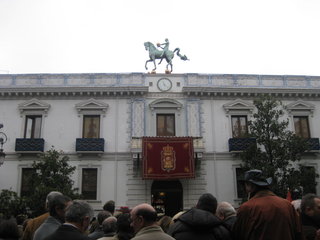When traditional festivals are dissonant with social integration
The Capture of Granada
What they are saying:
He: ¡Granada!
Crowd: What?
He: Granada!
Crowd: what?
He: in honour of the illustrious Catholic Monarchs, Don Fernando V of Aragon and Doña Isabel I of Castilla:
Viva Spain!
-Viva
Viva the king!
-Viva
Viva Andalusia!
-Viva
Viva Granada!
-Viva

When traditional festivals are dissonant
Festivals are an important sector of folk and popular culture. Because of the current importance given to culture and tradition considerable effort has been invested in the maintainance and fostering of such festivals. Nevertheless, as an expression of the past, the world-view which these festivals imply can occasionally collide against current social values, which are directly correlated to the issue of people living together in harmony. In this case, we very often speak from a traditionalism which is clearly based
on an acritical and reified view of culture.
La Toma de Granada, which takes place in this Andalusian town every year on January 2nd. This festival commemorates Spain’s conquest of Granada from the Moors in 1492. It is not a question of an official or institutional celebration but of a popular festival, which also has its place among the several Andalusian festivals enjoyed not only by insiders but also by foreign visitors. In the different acts comprising this festival, the Spanish army plays a salient role. The celebration contains performances which,
besides the fact that they emphasize a clear divisory line between winners and defeated, circunscribe a right-wing symbology. Given all these characteristics, detractors of this festival in Granada itself have spoken out. They understand that "the ceremony of the 2nd January does not contribute towards consolidating sentiments in favor of a community life and mutual tolerance on which every town which aspires to progress ought to be founded". All such protests by certain progressive
sectors of Granada’s citizenry have been not able, until now, to eliminate a symbology which inescapably must be wounding for the increasingly more numerous community of Maghrebi origin dwelling in the town.
People should also be critical in relation to those multicultural festivals which are now becoming a tradition in Europe. They intend to contribute toward a better integration of immigrants. Yet in spite of this laudable goal, these festivals can also bring with them collateral negative effects, such as the exoticization of immigrants.Thus, we can also find clashing social values.
Multicultural festivals, which are launched by institutions ornon-governamentalgroups, are taking place more and more frequently in recent years.
As opposition, they have invented: THE FESTIVAL OF THE three CULTURES and have tried to change the name of the "Toma de Granada/Capture of Granada" without sucess.
There is not publicity about it around the city, no posters, not even a pamphlet with the timetables, no info, nothing. The security measures are ridiculous, and the number of people who attend every year is insignificant taking into acount the number of inhabitants of the city. The time they are given is insignificant, and the only coverage about it that I saw was in a local paper "GranadaHoy", in which the alternative "festival of the three cultures" was being highlighted in opposition to the "traditional Capture of Granada".
0 comentarios